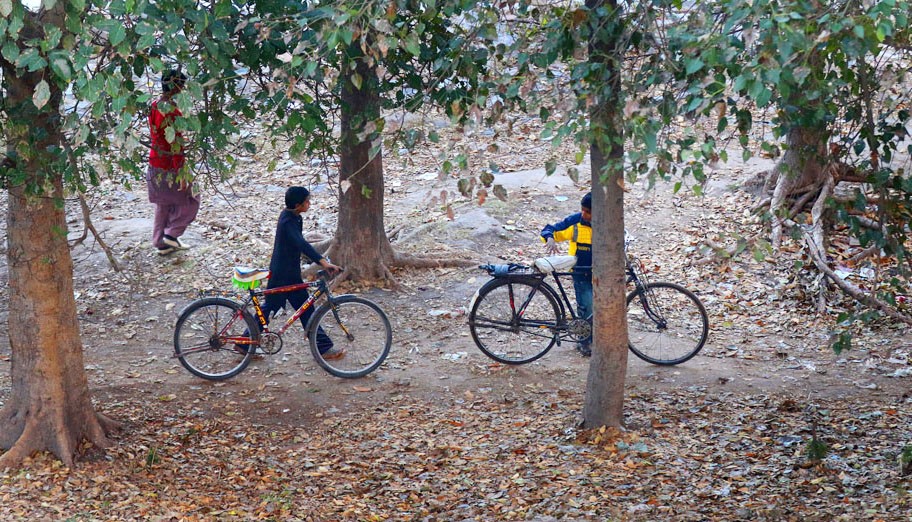
Talking to children about trees is like making trees speak for themselves

Trees have something cheerful about them. They lure birds and bards alike. But they have a very special relationship with children. All children may not have trees in their homes but they have an association of some sort with trees around them -- from climbing to playing around them to picking fruit to merely weaving stories.
Trees -- in fact all plants -- are like children in many ways. Children too bear flowers, leaves and fruits: when they smile they become flowers; as they grow up their thoughts grow into leaves; their laughter is like delicious berries. Thus, talking to children about trees is like making trees speak for themselves.
A conversation with some school-going and street children about the importance of trees in their lives generated some interesting responses. They all seem to know the importance of trees for a healthy environment.
Ayyan Ali, a student of class eight from Johar Town, seems to know it all too well. "Seeing trees makes me feel great. Trees not only provide oxygen, they also make the environment clean and healthy by reducing the pollution in air. I like conifer and pine. I like many trees but can’t name all of these for you now," he said, hurrying back to his younger brother to join him for a football game.
Aqsa Arif tells about a jamblang tree near her house where she goes often along with her friends to play and pick the fruit. She likes orange, jamblang and date trees. A class four student from Model Town, Aqsa has the same feeling for trees as Ayyan. "I like trees. There are a few in our home too. Trees keep the air clean. We should not cut trees. It’s too bad. How could we have clean air if we keep on felling trees?" she asks.
Khizar Khurram, a class seven student from Shahdara Town, is a few steps ahead than both Aqsa and Ayyan. He claims to have learnt many gardening tips from the gardener. "I find trees beautiful. I have lost count of trees I have seen. I like fruit bearing trees more than trees with flowers."
He find birds very attractive, especially when he hears them sing in the morning. "I like the voice of koel. I also like parrot for its sharp beak. There are lemon, orange, cactus trees in our home. I like to water them daily. I also like to help mali uncle when he comes to our home. He knows more about trees than I do and I learn something new from him each time we meet."
Children associate with trees and plants in a variety of ways. Some recognise trees from their flowers, some love trees for their fruits, some like to play under their shadow, some like parks and some like forests. Others like to draw trees on paper and colour them; or like to plant and water trees. Some like conifer more than cactus. Some love trees because they provide shade to birds in scorching heat. Some love birds more than trees because of their songs.
Omar Kamran, a class two student from Shahdara, likes trees for quite another reason. He likes to climb up trees and perch there in the company of birds.
I talked to Kamran when he was playing with his friends and family near the water area for pedal boating in the Model Town Park. "There is a peepal tree in our school. It is a large tree. We spend recess time playing under its shadow. I often climb up the tree and watch others play under it from above," he says giggling.
Climbing up trees is a favourite pastime. Aamna Ilyas, a class five student from Nishtar Colony, loves doing this. She recounts her visit to her aunt’s village where she along with her many friends and cousins had scaled up the jamun tree to pluck the fruit.
Some children like flower plants more than fruit bearing trees because of their mild sweet scent. Esha Qamar, a class nine student from Township, likes red roses and sunflower. "I love trees because they keep the environment clean. I like trees with broad leaves. But I like flower plants more because of their fragrance. There are many flower plants in our home. I look after them and water them daily."
According to one report, Pakistan has the highest annual ratio of deforestation in the world. Some environmental studies claim that unchecked cutting of trees is one of the main reasons behind deforestation.
And yet the sad fact is that we plant far less trees than we chop off.
When asked about the chopping off of trees in the name of development, children simply disapprove the idea. One wonders when the grown-ups will learn to love trees like children do.